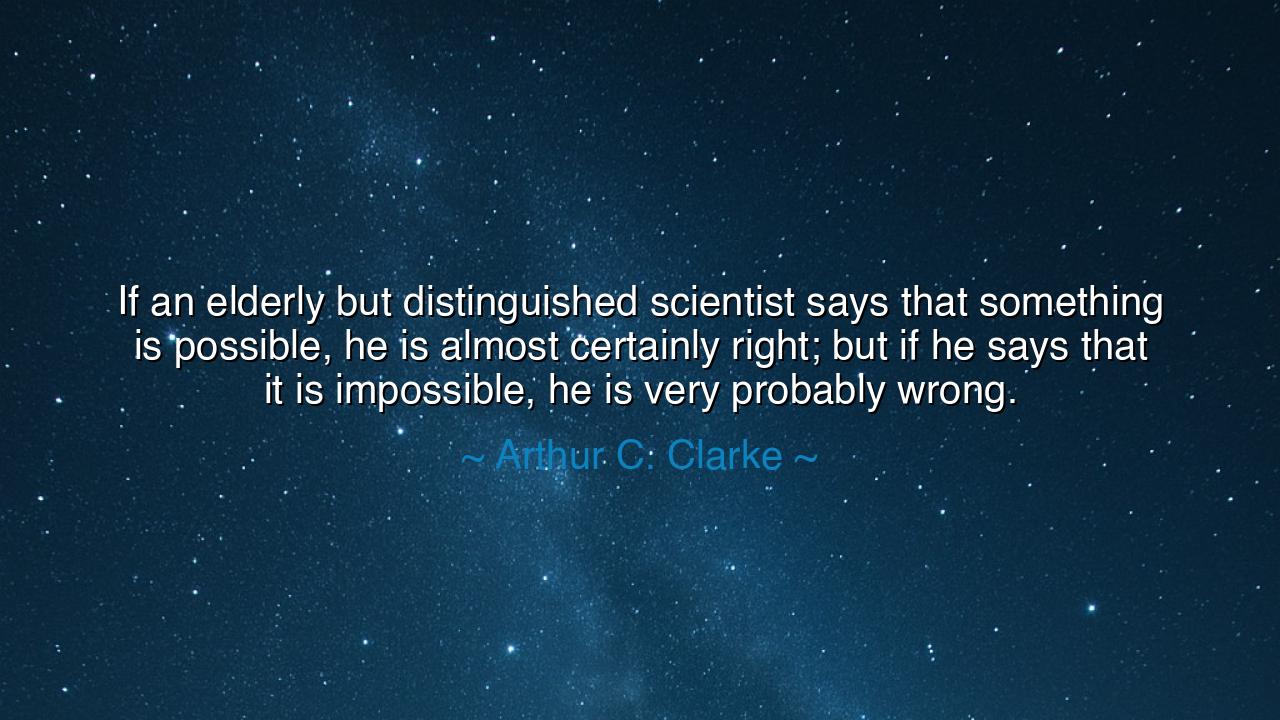
If an elderly but distinguished scientist says that something is
If an elderly but distinguished scientist says that something is possible, he is almost certainly right; but if he says that it is impossible, he is very probably wrong.






Arthur C. Clarke, prophet of science and dreamer of the stars, once gave this teaching: “If an elderly but distinguished scientist says that something is possible, he is almost certainly right; but if he says that it is impossible, he is very probably wrong.” These words carry the weight of centuries of struggle between doubt and discovery. They remind us that wisdom must be tempered with humility, for even the greatest minds cannot bind the future with their judgments. What seems impossible today may be the certainty of tomorrow, and what is declared “beyond reach” may already be stirring in the mind of a new generation.
The ancients themselves knew this truth. When the philosopher Thales predicted that an eclipse would darken the day, many thought such foresight belonged only to the gods. Yet the sky obeyed the patterns he had discerned, and the impossible became reality. From that day forth, mankind learned to mistrust the word “impossible.” Clarke, in his age, renewed this ancient wisdom, reminding us that even when knowledge is vast, the horizon is always further than we think.
Consider the tale of Lord Kelvin, one of the greatest physicists of the nineteenth century. He once declared that “heavier-than-air flying machines are impossible.” And yet, only a few years later, the Wright brothers lifted into the air, defying his words. Kelvin was not a fool—he was brilliant, respected, a master of his craft. But even brilliance cannot foresee the future. Here Clarke’s wisdom is proven: when a master says, “This may be done,” his faith is well-founded; when he says, “It cannot,” history often proves him wrong.
Another example lies in the realm of space travel. Many scientists once claimed it was folly to think humans could escape Earth’s gravity. Rockets, they said, could never carry the fuel required; the human body could never endure the journey. And yet, in 1961, Yuri Gagarin soared beyond the atmosphere, and in 1969, Neil Armstrong walked upon the Moon. What was called impossible was achieved within a single lifetime. Clarke himself foresaw the possibility of communications satellites, once dismissed as fantasy, and today they encircle the earth, carrying voices, visions, and knowledge across continents.
The lesson here is not to scorn the wise, but to temper reverence with vision. The aged scientist, distinguished by a lifetime of learning, has seen much and knows the strength of possibility; his faith in the possible is well earned. But when he denies the future, when he proclaims the limits of what man may do, he forgets that history itself is a tale of boundaries broken and barriers crossed. Clarke’s words remind us that the future belongs not to the cautious declarations of “never,” but to the daring spirit of “perhaps.”
In our own lives, we must take this truth to heart. When others tell you your dream is possible, rejoice, for you stand on solid ground. But when they tell you it is impossible, remember Clarke’s warning: they may be wrong. Do not let their doubt bind your spirit. What is impossible is often only what has not yet been attempted, or what requires courage beyond the ordinary. The future is made by those who dare to test the limits, even when the learned declare the limits absolute.
So I say to you, seekers of tomorrow: honor the wisdom of the past, but never be enslaved by it. Listen when the wise say, “This may be,” but take courage when they say, “This may not.” For the universe is vast, and its secrets are not yet finished. Let Clarke’s words be your banner: what is declared impossible may be your calling to achieve. Step boldly, for the future waits for those who dare to make the impossible real.






AAdministratorAdministrator
Welcome, honored guests. Please leave a comment, we will respond soon